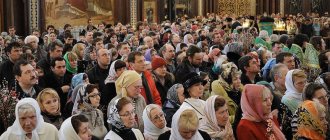Many parents who take their first steps in the temple face difficulties. They should figure it all out themselves, but instead of praying they have to calm down the restless child, who, unlike mom and dad, feels just at home in church. But time passes, children grow up and, it happens, flatly refuse to go to church, and parents again have to rack their brains: “What to do?”... For advice, we turned to the cleric of the Saratov church in honor of the Icon of the Mother of God “Quench My Sorrows,” priest Anatoly Konkov . Father Anatoly came to the Church after the birth of his daughter, and we hope that his answers to “children’s” questions will help other parents.
Andrey LOGINOV, Plenipotentiary Representative of the Government of the Russian Federation in the State Duma
The consciousness of a modern child is affected by a million impressions, causing a kaleidoscope of sensations. Computer games, television, huge movie screens “with the effect of presence” - all this is bright, fascinating, and tenaciously holds the child’s imagination. It is difficult to escape this, since these are the realities of modern civilization. And generations of our ancestors went to church services. This was perhaps the most important spiritual experience in their lives. Church rituals influenced their psychology, the church calendar influenced their physiological rhythms. All this has been imprinted into consciousness for centuries. And, I strongly suspect, into our genetic memory. And in the first years of a child’s life, it seems to me, this genetic memory works most effectively (later it will be replaced by social memory.) At this time, the child naturally, without prompting, without thinking, learns to walk, talk, react, and adopts the basic rules of behavior . And just as naturally, through feelings, outside of logic and consciousness, he will perceive the temple and church service.
At an older age, joining the Church will be more difficult. We begin to look at the world from the point of view of practical benefit, think critically, and often look for a serious evidence base for faith. For many, the church becomes a real revelation, but often we see how a person, considering himself an Orthodox Christian, does not really understand why he needs to go to church services. Or he goes at it, breaking himself. The lack of experience, skill, habit (in the good sense of the word) of being inside the temple is acutely affected. It is difficult for an adult to cross himself for the first time, precisely because he has never done this before, and the movement itself seems unnatural to him.
If a child feels the high poetics of a church service and is imbued with this, then his soul will undoubtedly be richer. It's not like going to an art gallery or a classical music concert. By bringing a child to church, adults show him the path to salvation - after all, this is the meaning of the Church for a Christian. It is unacceptable to force someone to do this if you feel the little person’s internal resistance. It is much more important to try to understand the internal reasons and ask for spiritual advice.
Invite a church minister
Invite the pastor who performed the blessing of your child to this table. It may seem strange to you that I am writing this, but there are also people who thought that the pastor was too busy to invite him to them. You have at least two reasons to invite him. The first is that he carried out the blessing of your child, and the second reason is written in the Bible like this:
We ask you, brothers, to respect those who labor among you, and those who preside over you in the Lord, and those who admonish you, and to honor them especially with love for their work; be at peace with each other. (1 Thessalonians 5:12-13)
Some parents showed their love and respect for their pastor who carried out the blessing of their baby by giving him a reward.
Galina GORENKO, Associate Professor, Department of Spanish, MGIMO (U) MFA of Russia
It is necessary to take children to church, and it is mandatory. This is necessary for both children and parents.
For an unintelligent child, the temple becomes like home: he gets used to it and is not afraid of the bearded guy in black, neither the crowd of people nor the loud singing bothers him - he feels good there. And this wonderful “homely” feeling of love and security, I am sure, will not disappear without a trace, will not leave the child in the future and will help him cope with life’s difficulties in adulthood, just as we are now helping him cope with his childhood fears. My two-year-old Varya asks: “Mommy, shall we go to the priest’s house?” - “Oh, no, Varyusha, I don’t have time” - “No, let’s go.” She reaches out for this - stands, prays as best she can, crosses herself. And looking at our kids in church, we learn to believe in God like a child, simply, freely and openly.
Children's souls are not small, but the same as ours. And she also works in the temple, soaking up the juice that she simply needs. If we do not fill the inner nature of children with divine grace from the early months, then their souls will be filled with something else. It is true what they say: a holy place is never empty. There is a human enemy who will not disdain anything, will not ask whether we want his “help” or not - then it will be much more difficult to knock him out of there.
We often hear from parents: “Why are we going to decide for the child what and who to believe in, why are we going to limit his freedom of choice. When he grows up, let him decide for himself.” This is a trivial fear of responsibility. And this is very dangerous - in this way we deprive the child of that sincere heartfelt feeling, which in adulthood is achieved only through great work and trials.
The birth of a baby, which we, foolishly, attribute only to ourselves, and his “getting back on his feet” does not exhaust our parental mission. After baptism, we do not hand over the child “to the Lord God,” but must in every possible way cultivate and support the spark of God in the child. After all, we have no doubts about whether to treat the child or not, we don’t ask: “Should you, Vanechka, have this vaccination?” So why do such questions arise regarding his spiritual health? The task of parents is to make every effort to ensure that, as an adult, their child makes the right choice.
Take care of spiritual food
People with manners take care when inviting guests and prepare a table with delicious food. It is also important to prepare the spiritual food that will be given to the guests. If you don't know how to do this, ask your pastor for advice and he will teach you. Your time at the table is a wonderful opportunity for the spiritual growth of all other Christians and for the evangelization of non-Christian guests. Let this meal be a meal of love, as was customary among the first Christians. Make sure there is also a consistent spiritual message, singing, testimony, and poetry at the table.
Nadiya SOLIMAN ALI SALEM, employee of the magazine “Thomas”
I think that very young children should not be taken to church for hours-long services. I have seen more than once that this is a serious test for them - they quickly get tired, begin to cry... This distracts other believers from prayer and prevents the priest from leading the service. It’s also not easy for parents to stand at work for so long with a small child, both mentally and physically. It is probably better to bring the child to Communion, as many parents do.
We didn't take our daughter to church for these reasons until she was three years old. I can say that visiting the temple has a beneficial effect on her, on her attitude towards others. In the church, the best sides of a person are revealed, and the little girl sees that adults can smile, be kinder and more tolerant... In a sense, in the church the childish face of adults is revealed and everything falls into place. I think this is important for children - they begin to see what they may or may not become.
Priests say that children, in their spiritual purity, feel God better than we adults. I think this is what Christ meant when he said, “Be like children.” And therefore, we should not deprive our children of presence in the house of God, even if we ourselves are not fully established in our faith. Figuratively speaking, if you yourself don’t like walks, you won’t prevent your child from being in the fresh air...
My daughter will make her choice herself. And I am sure that regardless of the path she chooses, visiting an Orthodox church will give her a lot of good things. And if, having matured, she becomes a believer, she will not face the “neophyte” problem: ignorance of church etiquette, a feeling of awkwardness in church... She will come there as if she were home.
Children and the Church: leave to stay?
The discussion on the cultural and educational platform, the topic of which was initially designated as “Children in the Church,” transformed into an interested conversation between different generations about teenagers in the space of the Christian faith. The general essence of the conversation was to formulate problems, build a dialogue between church parents, clergy and children who have reached adolescence. The main leitmotif of the conversation was not the answers, but the questions posed by young and adult participants. Questions are sometimes acute, sometimes unexpected, the answers to which will be given by active missionary work and time.
The moderator of the discussion was the editor-in-chief of the information and educational portal “Parishes” Evgenia Zhukovskaya.
Are children in the Church a matter for adults in the Church?
children were not the focus of the church mission precisely because there was a very lively and strong connection between children and parents. The younger generation was not taught anything separately, because they were supposed to learn everything from their parents
Second Secretary of the Diocesan Council of Moscow, rector of the Church of the Exaltation of the Holy Cross in Altufyevo, Archpriest Mikhail Prokopenko shared with the audience: “If ten years ago I had been invited to such a discussion, it would have been many times easier for me to speak, I would have found the appropriate words, I explained many phenomena, I would even give some advice. And now I understand: there is no method of what to do with children. And this, on the one hand, is our curse, and on the other, a blessing, because where there is no method, there is a place for living creative search.”
The clergyman reminded that when talking about what place children occupy in the life of the Church and what place the Church occupies in the lives of children, one must also keep in mind the question: at what time did this issue appear on the agenda of church life? “I asked myself this question from a practical point of view: I thought about how to make the children’s stay in church during divine services so that it would be useful and edifying for them, so that they would not spoil anything or interfere with anything,” said Father Mikhail. – I began to look for how this issue was resolved in ancient times, and realized that nothing could be read - at best, there were references that, as a rule, at the turn of the first and second millennia, a place in the choirs of Byzantine churches was allocated to women and children, while at the bottom stood men. Information about how children participated in the service turned out to be very scarce. I thought: maybe children were not considered full-fledged beings? But the words of the Lord Jesus Christ, “let the children come to Me,” indicate that Christians have always treated children as beings possessing full human dignity, which means it cannot be said that children were neglected. And then the thought comes to the following: children were not considered separately, because their lives could not be thought of as separate from the lives of adults.”
Thus, children were not the focus of the church mission or church preaching precisely because there was a very lively and strong connection between children and parents. The younger generation was not taught anything separately, because it was assumed that they learned everything from their parents, the shepherd stated.
He is confident that when it comes to children in the Church, the conversation inevitably returns to the question of adults in it. “Sometimes they try to use the priest as a resource for educational work, as a way to call children to order, teach them something, give them some skills, but nothing will come of it until adults themselves think about what they are doing in the Church,” - noted Father Mikhail.
In the viscous flow of life
a person who thinks about what his children will be like, what their spiritual life will be like, what their Christian path will be like, must not forget that nothing happens quickly
“Today we are trying to find approaches to our own children and at the same time we completely forget that yes, children can be taught, they can be trained, they can be made into completely church-going people, they will answer questions on Sacred History perfectly, but as a very wise doctor once said -pediatrician, “remember, my dears, words can only teach words.” And now I can continue her words: observing the life of their parents, children adopt their way of life, and paradoxically adopt it directly, but not immediately and not quickly,” noted Father Mikhail Prokopenko.
Life in its spaciousness and density does not allow one to quickly observe the changes taking place, the pastor emphasized: “Every person who thinks about what his children will be like, what their spiritual life will be like, what their Christian path will be like, should not forget that nothing is happening fast. We are growing surprisingly slowly. For example, an hour later a foal that is born is galloping vigorously next to its mare mother, while a born human goes through various, sometimes even painful, stages of growth for a very, very long time. As I already said, there is no method in this matter. The only thing we have to do is simply live next to our children so that at the Last Judgment, at this last test in the fate of every person, we will joyfully meet our Lord, Creator and Redeemer.”
Lifestyle - love
The spiritual talent of CHILDREN does not fade away and is preserved where there is strong mutual love between parents
At the same time, Father Michael suggested looking at the most striking images of spiritual giftedness - at John the Baptist, “the greatest of those born of women,” as the Lord Jesus himself characterized him, and at the Most Holy Theotokos, the Most Honest Cherub: “What do they have in common, why such a bright devotion to the will Is God observed in both cases? Church traditions and partly Scripture have preserved for us a very interesting, but not obvious detail, and it, it seems to me, can explain a lot. Spiritual and religious talent does not fade; it is preserved where there is strong mutual love between parents. There are probably exceptions to this rule, and it’s probably sometimes difficult to observe this, because not everything is visible, not everything is noticeable.” Another example can be called St. Sergius of Radonezh, and the reverent love of his parents.
“We can teach children words - they will even repeat these words with enthusiasm for some time, but children adopt a way of life, and love is a certain part of the way of life,” the priest is sure. Another important trait that children could learn from their parents is patience, which is an absolutely necessary thing in the Christian life.
Right to crisis
we need to recognize the right of our children to regain their faith
Archpriest Mikhail Prokopenko recalled that everyone experiences crises at certain periods of their lives, in children this is also caused by “growing pains”: “These crises replace one another, then occur in adulthood, and it cannot be ruled out that in the area of relationships with God there can also be such crises. They are natural, and we need to recognize our children’s right to experience these crises. We want to see them as independent, but at the same time we “fasten” them to our skirt or cassock. We want to see them responsible, but at the same time we decide everything for them ourselves. We want to see them praying to God on their own, but instead we require them to follow the procedure we once learned.”
He emphasized that we need to recognize the right of our children to, so to speak, regain their faith.
“Such crises also happen in adulthood, and they, it seems to me, can be quite useful and fruitful,” the priest believes. “There is nothing undignified about this: re-discovering one’s faith is not always convenient from the point of view of people observing it from the outside.”
A question of priorities?
“We taught photography, but we didn’t teach anything that we should have; It’s probably worth thinking about this and looking a little distantly from above: is it being done, what needs to be done?”
The rector of the Moscow Church of the Great Martyr Demetrius of Thessalonica on Blagush, Archpriest Andrei Milkin, especially drew the attention of listeners to the fact that at the beginning of church history, children were not considered separately from their parents and families. The book of the Acts of the Holy Apostles mentions baptisms that took place - so-and-so “and his household” were baptized, including, of course, children. In the future, perhaps only parochial schools can be called church institutions that have a special relationship specifically with children, and in this case, rather, we are talking about the function delegated by the state of teaching children to read and write, including through reading the Holy Scriptures, and also gaining some initial knowledge about religion. The main Christian education was entrusted to the family.
According to Father Andrei, church work specifically with children becomes noticeable in the 20th century in Russian diaspora. “In our country, this problem was revealed to us after 1988, when the Russian Orthodox Church came out of hiding. Almost simultaneously, the educational system that existed in the USSR, built on, among other things, ideological rules, collapsed,” the clergyman noted. He pointed out that sometimes at the parish level of work with children one could see attempts to replace the destroyed pioneer houses: photo circles, sports sections, music studios, etc. began to be created. However, Archpriest Andrei Milkin emphasized, one often has to deal with the fact that the students of these creative circles and studios, having matured, disappear from the life of the parish and leave the Church.
“So, we taught photography, but we didn’t teach something that we should have. It’s probably worth thinking about this and looking a little distantly from above: is it being done, what needs to be done?” - the shepherd believes.
Moreover, he mentioned, sometimes behind the problem of a particular child leaving the context of parish life is the question of setting priorities in conditions of a heavy workload of school-age children. “Yes, we bring the child to the temple, then we bring him with his legs, well, and then the growing child begins swimming lessons, English lessons, preparation for school, school itself, after which he gets tired. I say this as a priest who has heard this many times. So the child went to church when he was still in his mother’s tummy, and then in her arms, then he went to Sunday school, and then you see him less and less. You ask your parents and they answer: you understand, the children are tired, the only day of the week when you can sleep longer is Sunday, but you have to go to church, so he can’t cope.”
How not to become salty vobbles
“Our children, hearing that Christianity is the salt of life (and it is), at some point become like dried vobbles”
Speaking about what should be the way of working with children on the part of the priest in the Church, on the part of the parents, Associate Professor of the Department of Theology of the Moscow Theological Academy, rector of the Moscow Church of the Intercession of the Blessed Virgin Mary on Gorodnya, Archpriest Pavel Velikanov used an unusual metaphor: “Our children, listening about that that Christianity is the salt of life (and it is), at some point they become like dried vobbles, in which there is so much salt that, in order to put them in your mouth, you must first soak them, reducing its concentration - then the fish becomes more or less chewable, and while it’s practically a piece of salt, the roach will continue to hang on your string.”
He cited an episode from Sergei Fudel’s book “At the Walls of the Church,” who told how one day two boys entered the church - a six-year-old and an older boy, about eight or nine years old. The younger one's eyes are wide open - he came to church for the first time, he doesn't say anything. Suddenly his gaze rests on a huge crucifix that stands in the center of the temple. The boy raises his eyes to the elder and asks the question: “What is this?” The elder, already seasoned and knowing much more, answers: “And this is the truth.”
“For these children, religious education has reached its highest point, because in the minds of the little man an understanding has appeared of what the Cross is,” the priest emphasized. “He won’t tell you how many words Jesus said when he was on the Cross, what stops were on His Way of the Cross, he won’t be able to quote certain phrases from the Holy Scriptures by heart, but he knows perfectly well that Christ on the Cross is the truth. And he heard this not from the lips of a priest, not from the lips of his parents - this is what matured inside him.”
“And here it’s worth asking a painful question: are you and I ready to work with children at this level? – Father Pavel continued. – Do we want our children, once in the Church, to tell us things about the Church that you and I are not ready to hear? Are we ready for the fact that they can take and expand our understanding of Christianity in a completely new and unexpected direction for us and say: get out of your subculture, which is not a Church at all, it is just one of the varieties of numerous church subcultures. But we want our own, we want to have a party, we want to have circles and storytelling in English within the parish. We want to communicate, we want you to tell us how to learn activities that will be useful to us in the future, and so on. And when we see all this, it takes great courage from us to say: you know, children, you are not just our project - you yourself matter before God, and our task as parents is to create a space in which you yourself will build relationships between you and God, between you and the Church, between you and the Holy Scriptures, between you and those people who, in the same way, glance in the direction of the Church out of the corner of their eyes.”
Children's sermon?
“a children’s sermon should be heard, it can also influence adults and teach them something”
As part of the event, a unique video project “Orthodox ABC” was presented, in which children talk to children about faith, the Church, the lives of saints and much more. It is being implemented with grant support from the Orthodox Initiative program. The general discussion was attended by both the project manager, general director Diana Tevosova and the director of Radio VERA Roman Torgashin, as well as the guys who took part in the creation of the Orthodox ABC videos.
According to Diana Tevosova, one should not prevent children from coming to Christ at a young age, and so that they do not subsequently leave the Church, one must “show by example the experience of Christian life.” “If we show this by our example, they will not leave the church, but if we simply force children to go to church, and do not show how we ourselves live in the Church, they will leave us and say that we are hypocrites. If we are not hypocrites with children, if we speak to them in their language, sincerely try to go to Christ and do it not in letter, but in spirit, then the children will stay with us,” she is sure. Diana Tevosova believes: “We live today in difficult, but at the same time chic times. And at this time, a children’s sermon should sound; it can also influence adults and teach them something.”
A different language for every age
it is impossible to lock children in some closed space - the media environment still gets to them
Roman Torgashin drew attention to the lack of Orthodox education tools that would fit into the context of our time, oversaturated with media products of varying levels and quality.
“When we talk about raising children in the faith in church families, the first thing we have to face is the lack of content, because children cannot be locked in some closed space - the media environment still gets to them, the media spills on them,” he emphasized. . – And the first task that we see both as parents and as media specialists is to filter out the most harmful content that is destructive for children, and to put up the necessary barriers. On the other hand, it is necessary to provide content that would solve the set tasks of education or at least teaching. And thanks to the work of our colleagues - producers, teachers who are involved in this project, it seems to me that we are able to find a language for talking with children about faith.”
At the same time, Roman Torgashin noted that children of different ages have different psychological characteristics, and they need different approaches. “Children, while they are, due to their age-related psychology, in the orbit of obedience to their parents, it is possible to “feed” the necessary information. As soon as cognitive mechanisms are turned on, which are built on the denial of everything they were “fed” with before puberty, we are lost and don’t know what to do, we lose our children by this - we don’t see them at the Chalice, we don’t see them at the parish. But at least we seem to have found the necessary language to tell children about faith while they are little.”
*
The meeting was organized by the information and educational Internet portal “Parishes” and the “Co-operation” foundation. The text was prepared by Natalia Aleksandrovna Bubentsova for the portal https://prichod.ru/, from where we reprinted all this with pleasure :)
Dmitry ZAYTSEV, Chairman of the Board of Directors of the management
You know, there are amazing examples of how a child is changed by a church. The little son of one of my colleagues is a big fidget and cannot sit still. When he comes to our office, he starts running, jumping, throwing something around. And in the temple, on the contrary, he stands quietly for a couple of hours during the service. I think the atmosphere there is special, because the temple is the house of God. And children feel and perceive this very much, because they are more open and pure in soul than adults. Therefore, it is very important for them to be taken to church and receive communion from a very young age.
I am sure that we need to take children to church as often as possible, whether they are stupid or older. After all, there God’s grace descends on them - and this does not depend on age. Of course, everything should be logical and rational, and you should not force the child to stand for several hours without moving - any violence causes rejection. You can not take him to the entire service, but go outside with him for a while if he is tired.
What types of temples are there?
Orthodox churches are large and small, wooden, stone and even concrete. Some look like real cake, like St. Basil's Cathedral on Red Square in Moscow, while others are strict and white, like the Church of the Intercession on the Nerl near the city of Vladimir.
If you look at the temple from above, it will resemble a cross, and right in the middle of this cross there is a dome. Such churches are called cross-domed. A church can have one dome or several - three, five and even twelve. And the Church of the Transfiguration of the Lord on the island of Kizhi is crowned with twenty-two domes.
Cathedral
The main church of the city is called the cathedral. There are two of them in St. Petersburg - Kazansky and Isaakievsky. The most important Orthodox church in Russia is the Cathedral of Christ the Savior in Moscow. The Patriarch serves in it.
Each church has a name - after the name of the saint or significant event in honor of which its main altar is consecrated. Nikolskaya - in honor of St. Nicholas, Kazanskaya - in honor of the Kazan Icon of the Mother of God, Rozhdestvenskaya - in honor of the Nativity of Christ. What is the name of your favorite church?
Yulia MENSHOVA, actress, TV presenter
The fact that children should be taken to church is not a question for me. The question is how to make sure that this does not turn into a routine for them, into a duty. Personally, a book about children’s confession, where priests discuss this topic, helped me a lot.
It is clear that parents who go to church themselves tend to take their children to services more often and give them communion. But for unintelligent children (I emphasize, we are talking specifically about young children, and not about older children) this is often very difficult. They still don’t understand a lot, they get tired after a long service, they stop taking it seriously, they begin to behave badly in church - and sometimes no amount of persuasion from their parents works on them. For these children, the temple ceases to be the place where the Lord Himself lives. And it will be very difficult for parents to overcome this if their children, as they get older, flatly refuse to go to church.
In the mentioned book there is such an example: one mother of many children does not bring her small children to the entire service, but closer to Communion and infrequently, so that the mystery is preserved for them. They line up in single file to the Chalice, reverently approach, take communion, and just as quietly leave the temple.
What is said in this book answered my question very convincingly, and I agreed with it: a small child should not be forced to go to church frequently and spend many hours in services. A child should be accustomed to the temple gradually. At first this may be once every few months. But the older the child gets, the more often. And the most important thing is to preserve the feeling of the temple as a sacred, special place.
It’s not always easy for parents of “angels” either...
- Tamara, can you imagine, my little one today demanded to go for a walk immediately after the exclamation: “No one from the catechumens...”! Apparently, we have not matured enough to become faithful. We came back later, of course, but it turned out so funny!
- What’s more, the twins and I were completely forgotten at home today! I suspect that it was because our dad didn’t want to listen to the whole service concert on the topic: “And now I want other tights!” So he ran away with the elders without waking up the girls and me.
This funny dialogue with a friend, it seems to me, very clearly illustrates the life of parents. Children in the temple remain exactly the same children as in other places. They want the same thing - to run, play, new tights, take a walk.
These are the peculiarities of the child’s psyche - a child cannot be focused on one thing for two hours! This is where all these concerts begin...
Tatiana BARANOVICH, professor, MIEM
“There is no need to impose your own views on a child, he will choose his own path when he grows up,” this opinion can often be heard. Personally, I am strongly against this. Let's then not teach children anything at all. Even if they don’t go to school, what if something is forced on them there? No, the child must be raised, explained what is good and what is bad. And if, when he grows up, he suddenly doesn’t like something, then he will decide for himself.
Unfortunately, we baptized our daughters late - one was four years old, the other seven, but since then they have always been in church. Our granddaughter also receives communion regularly.
It is definitely necessary to bring children to church. Faith is the basis of education; without it, nothing is possible. If we want to form an Orthodox worldview, then we must teach the child to go to church from a very young age, try to teach patience, humility... True, it is important to observe moderation. The rector of our church, Father Maxim, for example, recommends bringing small children only to Communion - so that they do not get tired and the long service does not seem very difficult to them.
Do concerts get in the way?
An interesting question, of course. Often, to any attempts to start a conversation about the behavior of children in any place, including in church, the answer is heard: “It’s a child!” This phrase usually ends stories about how children noisily played catch-up with each other during the service, how a mother could not calm the child down for about 15 minutes, but for some reason did not go out, even if it was possible to go out...
It still seems to me that this is a reduction to the point of absurdity of the indisputable fact that children are different from us. This is a unique form of protection. It seems to parents that all childless people are simply against children.
I specifically asked my childless sister, from whom I sometimes heard complaints that children interfere with services, whether this always happens. She gave a whole list of situations in which children do not interfere in any way - when they somehow make candles, when they calmly walk around the temple, draw, or say something in their own language. Even children lying on the floor do not distract her!
But such children, especially girls in elegant dresses, are a great distraction for their mothers, I thought, remembering my godmother’s story about how her daughter in a white dress lay somewhere on the floor on Easter and, of course, got her dress dirty.
Concerts, of course, disturb both others and parents. Everyone finds it difficult to concentrate on the service, hence the nervous mothers and tense parishioners.
Even worse, the children themselves get tired. After all, children don’t throw concerts just like that. Of course, this is mostly due to fatigue.
Natalia ASTAKHOVA, editor-in-chief of the Bely Gorod publishing house
I don’t understand: what does “unintelligent” mean? What do we understand about this? God works in mysterious ways. Even if this is my child, about whom I seem to know everything, but what do I know? After all, it is not even known who is closer to Christ - his child’s soul, which has not had time to accumulate the baggage of sins, or mine...
So we need to lead. But it is only necessary that the child does not always remain “unintelligent.” We must try to show him and explain the structure of the temple, the themes of the paintings, the essence of this or that ritual. It is necessary to tell the Gospel story or the life of a saint looking from an icon. Let the temple become a home for him, where every corner is familiar.
There is no need to be afraid to pose “adult” problems to your child - about the meaning of life, about good and evil. He can give an unexpected and brilliantly simple answer to them. I won’t forget how one evening a difficult situation was discussed at a family council. A five-year-old son running past, hearing another sad argument, stopped and said: “Grandfather, why are you so worried? Don’t you believe in God?..”
It is necessary not only to lead, explain, tell, but also, of course, to try to find a sensitive, kind priest. So that the baby is understood and his questions and problems are taken seriously. In general, it is surprising how, while taking care of our body, we do not think about the soul. If you get sick, call a doctor immediately. But how nice it would be if every family had its own “spiritual family doctor”!..
A little older
It becomes more difficult for those who begin to walk independently. At this age, children still cannot understand why they were brought to the temple, but they also have more interests in life, they are eager to explore the world.
I remember this age of my eldest son with some horror, because it seems to me that during this period all I did was follow him everywhere: at home, on the street, at a party and in church, of course.
The only thing that saved us then was a sling, when our son was still tired of exploring the world and wanted to sleep, and also candles! The candles burn interestingly, they are pleasant to the touch, and in the end you can simply chew them!
You shouldn’t forget about food even at this age. Fortunately, now there is no problem buying baby food, and a jar of vegetable or fruit puree will help you hold out without hysterics until the end of the service!
Priest Andrey BLIZNYUK, teacher at an Orthodox gymnasium
In the Gospel there is a direct commandment of God about children. Moreover, the Lord not only said that children should not be prevented from coming to Him, but that the Kingdom of Heaven belongs to them (Gospel of Matthew, chapter 19, verse 14).
The natural property of a child is to trust his parents, so they can easily explain even to unintelligent children what the Church Sacraments are and why they need to participate in them. And words are not needed here. The main thing is for the child to feel that all this is meaningful and important for his dad and mom. Therefore, before bringing foolish children to Church, the parents themselves must consciously come there and let Christ into the life of their family.
The main thing is to avoid spiritual abuse of children. Sometimes you have to watch how parents force their kids to stand through the service from beginning to end. The first ten to fifteen minutes pass calmly: the child is captivated by the beauty of the temple, he looks at the candles, icons and really sincerely tries to pray. And then he gets tired, starts running around the temple, making noise, playing, etc. It is difficult even for an adult to stand with concentration and pray for two hours, let alone a child! For him, ten minutes are enough, which he spends in the temple before the Sacrament of Communion.
There is another, more subtle way of spiritual violence against a child. Its danger is that this violence is carried out under the good slogan of protecting the rights and freedom of the child. The paradox is that the defenders of these rights and freedoms actually deny children any freedom and decide everything for him: now he is small, he does not understand anything, but, they say, he will grow up and make his own choice. Only one thing is not taken into account here: faith, church life is not an intellectual exercise for adults, and it does not begin after receiving a passport. By tearing a child away from the mystical life of the Church, from the Sacraments, and therefore from communion with God, he can be deprived of his main freedom - the freedom to become an independent person, the freedom to resist sin at a conscious age.
Basic rules of behavior in the temple
Before entering the temple, they make the sign of the cross three times and pray: “Lord, have mercy!” Then they buy candles in a church shop. Candles are very different: wax, paraffin, large, small. It is wrong to think that the size of the candle affects the speed at which God hears our prayers. After all, the Lord does not look at the candle, but at our heart.
Child in the temple
The center of the temple is the place for the holiday icon. The first candle is placed here. It is lit from another candle that is already on the candlestick, then the bottom of the candle is melted so that it stands better, and we place it. According to pious tradition, Orthodox Christians venerate the shrine. First, they are baptized twice, then they venerate the icon and are baptized a third time.
After this they go to the Crucifixion, which is sure to be in every temple. A candle is also placed in front of him. If there is no free space on the candlestick, don’t be upset. You can put a candle on a candlestick, and the servants will definitely light it at a convenient time. Before the crucifixion they bow to the ground.
Important: bowing before shrines is only an external manifestation of our reverence, our strong feeling. It happens that there are a lot of people in the temple, and with our bows we can disturb other worshipers. We will not push those around us while bowing. We try to always remember about others.
You need to venerate the Crucifixion only by touching the Savior’s feet. If we venerate the icon of the Mother of God, then we touch only the hand with our lips and in no case the face. It's not reverent. In the same way, we light candles at the icons of saints whom we especially venerate. And we pray in front of these icons for the health of ourselves and our loved ones.










